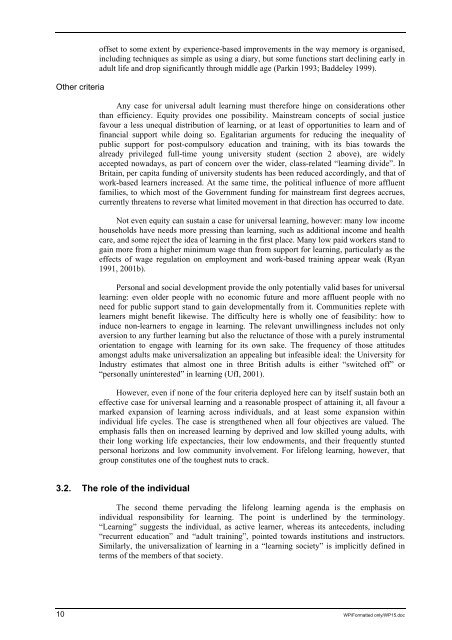Lifelong learning - International Labour Organization
Lifelong learning - International Labour Organization
Lifelong learning - International Labour Organization
Create successful ePaper yourself
Turn your PDF publications into a flip-book with our unique Google optimized e-Paper software.
Other criteria<br />
offset to some extent by experience-based improvements in the way memory is organised,<br />
including techniques as simple as using a diary, but some functions start declining early in<br />
adult life and drop significantly through middle age (Parkin 1993; Baddeley 1999).<br />
Any case for universal adult <strong>learning</strong> must therefore hinge on considerations other<br />
than efficiency. Equity provides one possibility. Mainstream concepts of social justice<br />
favour a less unequal distribution of <strong>learning</strong>, or at least of opportunities to learn and of<br />
financial support while doing so. Egalitarian arguments for reducing the inequality of<br />
public support for post-compulsory education and training, with its bias towards the<br />
already privileged full-time young university student (section 2 above), are widely<br />
accepted nowadays, as part of concern over the wider, class-related “<strong>learning</strong> divide”. In<br />
Britain, per capita funding of university students has been reduced accordingly, and that of<br />
work-based learners increased. At the same time, the political influence of more affluent<br />
families, to which most of the Government funding for mainstream first degrees accrues,<br />
currently threatens to reverse what limited movement in that direction has occurred to date.<br />
Not even equity can sustain a case for universal <strong>learning</strong>, however: many low income<br />
households have needs more pressing than <strong>learning</strong>, such as additional income and health<br />
care, and some reject the idea of <strong>learning</strong> in the first place. Many low paid workers stand to<br />
gain more from a higher minimum wage than from support for <strong>learning</strong>, particularly as the<br />
effects of wage regulation on employment and work-based training appear weak (Ryan<br />
1991, 2001b).<br />
Personal and social development provide the only potentially valid bases for universal<br />
<strong>learning</strong>: even older people with no economic future and more affluent people with no<br />
need for public support stand to gain developmentally from it. Communities replete with<br />
learners might benefit likewise. The difficulty here is wholly one of feasibility: how to<br />
induce non-learners to engage in <strong>learning</strong>. The relevant unwillingness includes not only<br />
aversion to any further <strong>learning</strong> but also the reluctance of those with a purely instrumental<br />
orientation to engage with <strong>learning</strong> for its own sake. The frequency of those attitudes<br />
amongst adults make universalization an appealing but infeasible ideal: the University for<br />
Industry estimates that almost one in three British adults is either “switched off” or<br />
“personally uninterested” in <strong>learning</strong> (UfI, 2001).<br />
However, even if none of the four criteria deployed here can by itself sustain both an<br />
effective case for universal <strong>learning</strong> and a reasonable prospect of attaining it, all favour a<br />
marked expansion of <strong>learning</strong> across individuals, and at least some expansion within<br />
individual life cycles. The case is strengthened when all four objectives are valued. The<br />
emphasis falls then on increased <strong>learning</strong> by deprived and low skilled young adults, with<br />
their long working life expectancies, their low endowments, and their frequently stunted<br />
personal horizons and low community involvement. For lifelong <strong>learning</strong>, however, that<br />
group constitutes one of the toughest nuts to crack.<br />
3.2. The role of the individual<br />
The second theme pervading the lifelong <strong>learning</strong> agenda is the emphasis on<br />
individual responsibility for <strong>learning</strong>. The point is underlined by the terminology.<br />
“Learning” suggests the individual, as active learner, whereas its antecedents, including<br />
“recurrent education” and “adult training”, pointed towards institutions and instructors.<br />
Similarly, the universalization of <strong>learning</strong> in a “<strong>learning</strong> society” is implicitly defined in<br />
terms of the members of that society.<br />
10 WP/Formatted only/WP15.doc

















